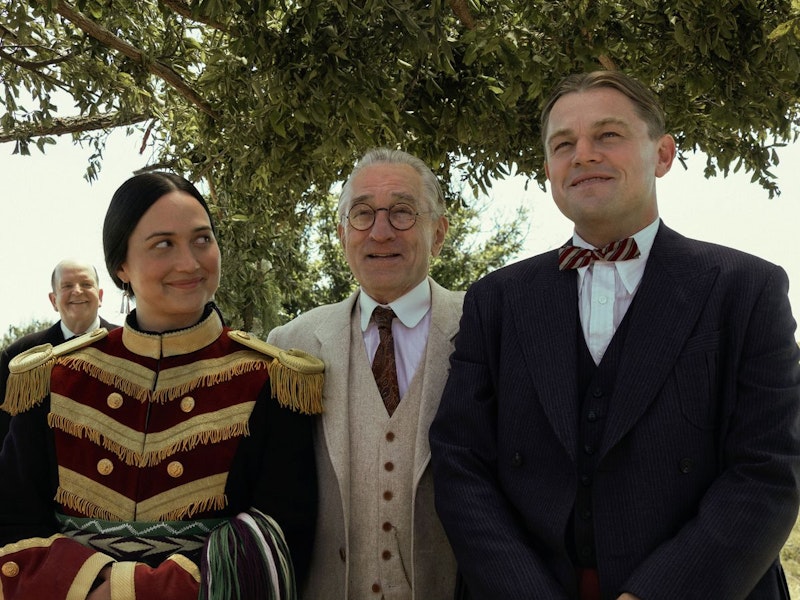Like many people, I’d been looking forward to Martin Scorsese’s Killers of the Flower Moon for months, after the teasers started appearing on the internet. It was an “event” film, in a year laid low by the Hollywood strike and, as usual, the glut of franchise superhero movies that I’ve never watched, and never will; since Oppenheimer I’ve gone to the theater just twice, seeing the silly but funny Bottoms and Jonathan Demme’s nostalgia-steeped Stop Making Sense. At a matinee last Saturday at Baltimore’s Charles Theatre, it was half-full for Killers, not bad for an 11:50 start time. Unlike Scorsese’s The Irishman, a dud that left me squirming, the 3:26 length didn’t bother me at all: it’s a reasonably engaging film—even if my expectations weren’t met—with a standout performance from Lily Gladstone, and (after The Irishman), a jaunty turn from Robert DeNiro.
My mind wandered throughout, however, even if the slow-paced film wasn’t at all boring. Two hours in, I left to take a whiz, but unlike films such as Uncut Gems or First Reformed—where you told the bladder to behave itself—wasn’t concerned that I’d miss much. Aside from the low volume, probably intentional, and as my hearing is good, was only an impediment when the noise from an adjacent room where the Taylor Swift concert movie was playing, what really bugged me was the miscasting of Leonardo DiCaprio, playing the conflicted Ernest Burkhart, doing the bidding of the rapacious William Hale (DeNiro) to pillage Oklahoma’s Osage Nation, while genuinely in love with Gladstone’s character Mollie Kyle. DiCaprio has few leading men peers today, and his role in Scorsese’s The Departed was phenomenal, as well as The Wolf of Wall Street and Catch Me If You Can.
The problem is DiCaprio (46 when Killers was filmed) is too old for the role: his Burkhart first appears as a WWI vet returning from the war to make money, screw women, and working for Hale. DiCaprio’s a handsome man, but he’s in middle age—thick and muscular—and looks it: America sent young adults overseas, so Burkhart’s appearance makes no sense. Scorsese needed DiCaprio and DeNiro (whose age is also off-kilter for his role) for the box office and I understand that. But I kept thinking during the film that it was very weird. There aren’t many marquee young male actors today, but I think Lucas Hedges (26) or Austin Butler (32) would’ve made more sense for the Burkhart part.
As I said, the film’s slow pace allowed for mental breaks, and I thought about Bruce Springsteen’s song “Promised Land” from his still-acclaimed 1978 LP Darkness on the Edge of Town, which came up on my iPod the day before at the office. I loved the song when it came out, I was 23, for Springsteen’s (self-consciously) anthemic vocal and the Phil Spector Wall-of-Sound production. Now, the lyrics (not Springsteen’s long suit, with some exceptions, especially “Atlantic City,” “Brilliant Disguise” and “American Skin”) seemed really stupid. Never mind the pose of a hard-luck working man in Utah—when anyone deigns to criticize The Ambassador of Rock ‘n’ Roll, that’s the common complaint—but this couplet is nonsense: “The dogs on Main Street howl ‘cause they understand/If I could take one moment into my hands/Mister I ain’t a boy, no I’m a man/And I believe in a promised land.” Is that a riddle? Are these dogs clairvoyant, like Mr. Peabody, and all-knowing? And: “Sometimes I feel so weak I just want to explode/Explode and tear this whole town apart.” How’s the narrator going to tear the town apart if he’s so weak? The lyrics to Spector’s dozens of hits in the early-1960s aren’t Yeats, nor are they intended to be, but songs like “He’s a Rebel” and “Be My Baby” make a lot more sense than “Promised Land.”
Later on in Killers, when Burkhart’s in jail, I thought about Colin Walsh’s debut novel Kala and how the copy I received (the book came out in June) was really messed up, which is an example of the lax standards at publishing houses (and diminished staff) today and also a disservice to Walsh, whose whodunit about a group of friends on the West Coast of Ireland was fairly compelling. I was reading the novel, on page 84, and then the next page was 277. Huh? Not long after, it shifted from page 308 to 117. I persevered, for the intrigue was worthwhile (if not Walsh’s slightly-above pedestrian prose), but had to read repeated passages as I lumbered to the end.
Once done, I read a Washington Post review of Kala by Ellen Atkins, who gave the novel a rave. She writes: “With revelation upon revelation, [the characters’] ordinariness seems all the more mysterious, and this first-time novelist all the more masterly in writing in such an original voice.” I assume Atkins received an advance copy of Kala, as is still standard practice (for as long as book reviews are published), and not the mangled version I bought in early-September. Isn’t that something? Doubleday sends reviewers (maybe an uncorrected proof!) an ordered novel, and consumers like me get the damaged goods.
—Follow Russ Smith on Twitter: @MUGGER2023

